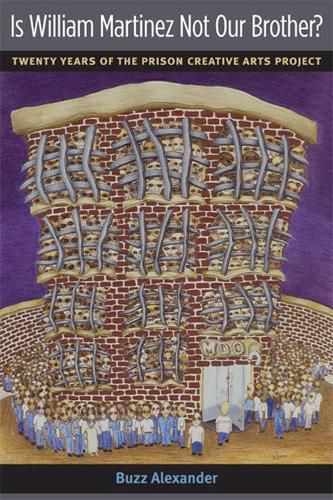Readings Newsletter
Become a Readings Member to make your shopping experience even easier.
Sign in or sign up for free!
You’re not far away from qualifying for FREE standard shipping within Australia
You’ve qualified for FREE standard shipping within Australia
The cart is loading…






Prisons are an invisible, but dominant, part of American society: the United States incarcerates more people than any other nation in the world, with 25 percent of the world’s prisoners currently held within its borders. In Michigan, the number of prisoners rose from 3,000 in 1970 to more than 50,000 by 2008, a shift that Buzz Alexander witnessed firsthand when he came to teach at the University of Michigan. Is William Martinez Not Our Brother? Describes the University of Michigan’s Prison Creative Arts Project (PCAP), a pioneering program founded in 1990 that works with incarcerated youth and adults in Michigan juvenile facilities and prisons. Alexander recounts the genesis and evolution of this radically pragmatic and original system that begins with university courses for credit, then offers students a university-based non-profit organization through which they may continue and deepen their practice, and finally gives them a national network as well as connections with the national movement resisting mass incarceration in this country, and with social careers in general. By giving incarcerated individuals an opportunity to participate in the arts, PCAP enables them to withstand and often overcome the conditions and culture of prison, the policies of an incarcerating state, and the consequences of mass incarceration. The book is also a deeply personal account of Alexander’s long commitment to confronting the continually rising numbers of prisoners in America, his dedication as an educator, and his attempts to provide a way to reach out on a practical and emotional level to inmates. The model he describes applies to both public scholarship and everyday politics and will inspire readers in all fields.
$9.00 standard shipping within Australia
FREE standard shipping within Australia for orders over $100.00
Express & International shipping calculated at checkout
Prisons are an invisible, but dominant, part of American society: the United States incarcerates more people than any other nation in the world, with 25 percent of the world’s prisoners currently held within its borders. In Michigan, the number of prisoners rose from 3,000 in 1970 to more than 50,000 by 2008, a shift that Buzz Alexander witnessed firsthand when he came to teach at the University of Michigan. Is William Martinez Not Our Brother? Describes the University of Michigan’s Prison Creative Arts Project (PCAP), a pioneering program founded in 1990 that works with incarcerated youth and adults in Michigan juvenile facilities and prisons. Alexander recounts the genesis and evolution of this radically pragmatic and original system that begins with university courses for credit, then offers students a university-based non-profit organization through which they may continue and deepen their practice, and finally gives them a national network as well as connections with the national movement resisting mass incarceration in this country, and with social careers in general. By giving incarcerated individuals an opportunity to participate in the arts, PCAP enables them to withstand and often overcome the conditions and culture of prison, the policies of an incarcerating state, and the consequences of mass incarceration. The book is also a deeply personal account of Alexander’s long commitment to confronting the continually rising numbers of prisoners in America, his dedication as an educator, and his attempts to provide a way to reach out on a practical and emotional level to inmates. The model he describes applies to both public scholarship and everyday politics and will inspire readers in all fields.